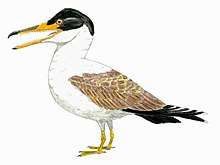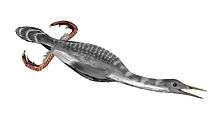Eoenantiornis
Eoenantiornis is a genus of enantiornithean birds which lived during the early Cretaceous period (124.6 Ma ago). It is known from a single fossil specimen found in the Yixian Formation in Liaoning province, China.
| Eoenantiornis | |
|---|---|
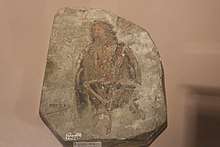 | |
| Holotype specimen, Paleozoological Museum of China | |
| Scientific classification | |
| Kingdom: | Animalia |
| Phylum: | Chordata |
| Clade: | †Enantiornithes |
| Order: | †Eoenantiornithiformes Hou et al., 1999 |
| Family: | †Eoenantiornithidae Hou et al., 1999 |
| Genus: | †Eoenantiornis Hou et al., 1999 |
| Species: | †E. buhleri |
| Binomial name | |
| †Eoenantiornis buhleri Hou et al., 1999 | |
In 1999, the type species Eoenantiornis buhleri was named and described by Hou Lianhu, Larry Martin, Zhou Zhonghe and John Alan Feduccia. The generic name combines a Greek ἠώς, èos, "dawn" with Enantiornis, in reference to a presumed more basal position in relation to that genus. The specific name honours the late German paleornithologist Paul Bühler.[1]
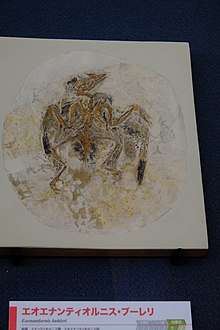
The holotype, IVPP V11537, was found at Heitizigou in Liaoning in a layer of the lower Yixian Formation dating from the early Aptian. It consists of a nearly complete and articulated skeleton with skull compressed on a plate, preserving most of the feather integument.[1] It represents a not fully grown individual.[2]
In 2005, Eoenantiornis was completely redescribed.[2]
Originally, the species was placed in a "family" Eoenantiornithidae and even an "order" Eoenantiornithiformes.[1] In 2005, these concepts were abandoned and it was concluded that the position was in the clade Euenantiornithes. It is one of the oldest known advanced enantiornithines.[2]
References
- Hou L., Martin L., Zhou Z. and Feduccia A., 1999. Archaeopteryx to opposite birds - missing link from the Mesozoic of China. Vertebrata PalAsiatica. 37(2), 88–95.
- Zhou Z., Chiappe L. and Zhang F., (2005). "Anatomy of the Early Cretaceous bird Eoenantiornis buhleri (Aves: Enantiornithes) from China." Canadian Journal of Earth Sciences, 42 (7): 1331–1338.
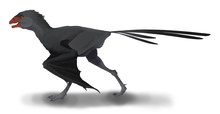

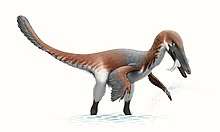
.png)



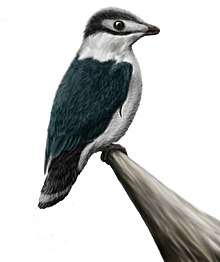

.png)

